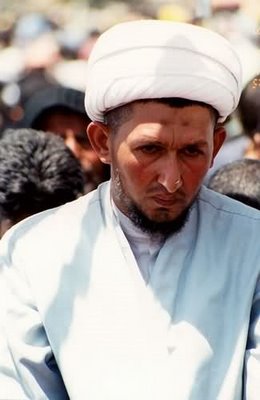
Sunni religious scholar
Main group in Islam, making up 90% of the religion's adherents. Has been dominating almost continuously since 661, when the Shi'is departed from the main fold (the Kharijis left in 658). Sunni Islam claims to be the continuation of the Islam as it was defined through the revelations given to Muhammad and his life, a claim which is substantiated through the fact that Shi'i Islam for a number of decades had very little following and had no real, formal organization. As for the theology, Sunni Islam represents no more of a continuation of Islam than the other orientations.
Hence one should be careful about thinking of Sunni Islam as mainstream Islam, and clearly refrain from calling it "orthodox". None of the 3 orientations of Islam coming out of the schisms of the 7th century, can do no less than trace their origins back to the very first Muslim societies, and for the bystander none of the orientations must be deemed as inferior to the others.
Sunni Islam has its name from its identification with the importance of the Sunna (the examples from the hadiths), which earlier than in Shi'i Islam was established as a central element in Islam, and central to understanding the full truth in the religion. There was a need to establishing a law, called Shari'a (for which the hadiths served as a central source), as Sunni Islam was the religious orientation of the rulers, while the Shi'is did not establish administrative organizations for yet a long time to come.
The basis of the Iraqi Consitution is within the traditions of Shari'a Law. It might be that is a concession to include the Sunni, but, without knowing the thinking behind the Grand Ayatollah's 'cooperation initative' in the beginnings of the Iraq Central Government. One has to question the actual desire of these ethnicities to govern together. When the first one hundred representatives were chosen, the Cleric al Sadr was under seige at the Imam al Mosque. Something tells me that soured the eventual outcome of any cooperation of the Shi'ites with the Sunnis.
